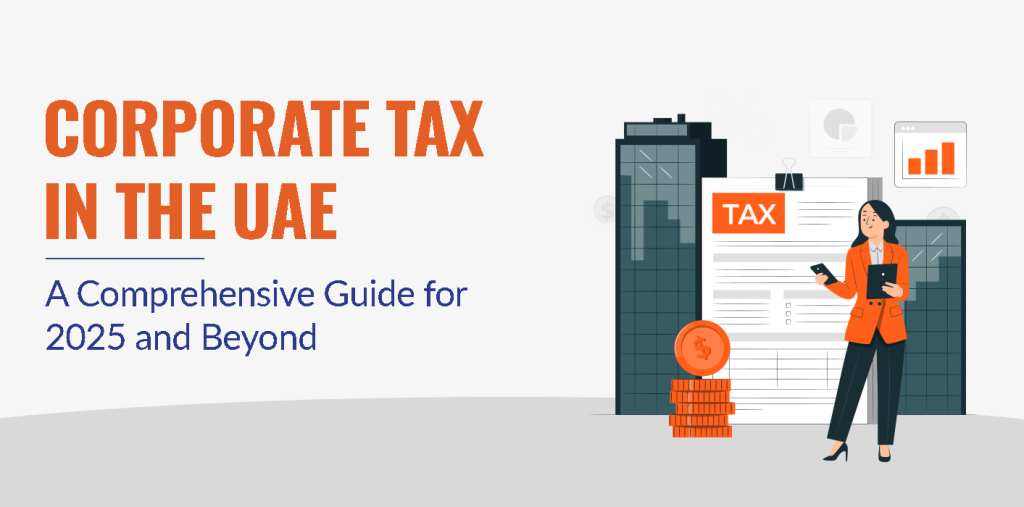The corporate tax landscape in the UAE is undergoing a significant transformation. Once known as a tax-free business haven, the UAE has gradually adopted taxation frameworks to align with global standards. This evolution is aimed at bolstering its economy, attracting foreign investment, and ensuring compliance with international tax practices. Here, we’ll break down everything you need to know about corporate tax in UAE as of 2025 and beyond.
Overview of Corporate Tax in the UAE
The introduction of corporate tax in UAE marks a pivotal shift in the country’s fiscal policy. Effective from June 1, 2023, corporate tax applies to businesses operating within the UAE at a standard rate of 9% on taxable income exceeding AED 375,000. This threshold ensures support for small businesses and startups.
- Applicability: Corporate tax in the UAE applies to businesses operating in both the mainland and certain free zones, subject to specific regulations.
- Exemptions: Government entities, public benefit organizations, and companies engaged in the extraction of natural resources are exempt from corporate tax.
- Global Minimum Tax: The UAE aligns with the OECD’s Pillar Two framework, imposing a global minimum tax of 15% on large multinational corporations meeting specific criteria.
Who is Subject to Corporate Tax?
Corporate tax in UAE applies to a wide range of entities, including:
- Mainland Businesses: All entities registered and operating in the UAE mainland are subject to corporate tax.
- Free Zone Companies: Businesses in free zones are taxed at a 0% rate on qualifying income but may face a 9% tax on non-qualifying income.
- Foreign Entities: Foreign companies earning income from the UAE may also fall under the purview of corporate tax if they have a permanent establishment in the country, derives state sourced income or earns income from immovable property in UAE (I.e. Nexus in UAE). In instances where a Non-Resident Person earns State Sourced Income only and where this income is not attributable to a Permanent Establishment in the UAE, the income is currently subject to a 0% Withholding Tax. Practically, this means no Corporate Tax liability arises in this situation.
However, exempt Persons fall into one of four categories:
1. Automatically Exempt Persons: Government Entities.
- Exempt if they notify the Ministry of Finance, and meet relevant conditions: Extractive Businesses and Non-Extractive Natural Resource Businesses.
- Exempt if listed in a Cabinet Decision and meet relevant conditions: Government Controlled Entities and Qualifying Public Benefit Entities.
- Exempt upon application to, and approval by, the FTA: 71
2. Public and private pension or social security funds.
3. Qualifying Investment Funds.
4. Juridical persons incorporated in the UAE that are wholly owned and controlled by certain Exempt Persons.
Any other Person as may be determined in a decision issued by the Cabinet at the suggestion of the Minister.
Objectives of Implementing Corporate Tax
The introduction of corporate tax in UAE is a strategic decision driven by several key objectives and to achieve several strategic goals:
- Economic Diversification: With fluctuating oil prices impacting revenue streams, the UAE aims to diversify its economy by establishing alternative sources of income.
- International Compliance: By aligning with the OECD’s Base Erosion and Profit Shifting (BEPS) framework, the UAE promotes fair tax practices and addresses international concerns about tax havens.
- Business Competitiveness: Strengthening its global reputation as a business hub with clear, predictable tax laws.
Corporate Tax Compliance and Filing
Compliance with corporate tax regulations requires businesses to adhere to specific processes, including registration, record-keeping, and filing tax returns. Non-compliance can result in significant penalties, underscoring the importance of staying informed and proactive.
- Register for Corporate Tax: All taxable entities must register with the Federal Tax Authority (FTA) and obtain a Tax Registration Number for Corporate Tax.
- Non-Resident Persons that do not have a Permanent Establishment in the UAE and only earn State Sourced Income can choose not to register for Corporate Tax purposes. However, Non-Resident Persons that have a nexus in the UAE (arising from earning income from Immovable Property in the UAE are required to register.
- Maintain Accurate Records: Businesses need to maintain proper financial records to determine taxable income.
- File Tax Returns: Annual tax returns must be submitted within 9 months after the end of the financial year.
Non-compliance could result in hefty fines, making it essential for businesses to stay informed and meet all regulatory requirements.
How Stratrich Can Help
Stratrich Consulting offers end-to-end solutions to simplify corporate tax compliance in the UAE. From assisting with business setup in UAE mainland to ensuring accurate record-keeping and timely tax filings, our experts are equipped to navigate the complexities of the new tax regime. Whether you need help with registration, documentation, or strategic tax planning, Stratrich is your trusted partner for corporate tax compliance.
Implications for Businesses
The implementation of corporate tax has significant implications for businesses, including:
- Profit Margins: The introduction of tax obligations may affect profitability, particularly for high-income businesses.
- Tax Planning: Companies will need robust tax strategies to optimize their tax liability while ensuring compliance.
- Free Zone Benefits: Businesses in free zones must revisit their operational structures to align with new tax regulations.
Corporate Tax in the UAE: Beyond 2025
Looking forward, the UAE’s corporate tax framework is expected to evolve further. Potential developments may include:
- Adjustments to Tax Rates: The government may revisit tax rates based on economic performance and global trends.
- Global Tax Compliance: Businesses with international operations will need to adapt to OECD-driven global tax frameworks, such as the Pillar Two minimum tax.
- Digital Taxation: As the UAE embraces digital transformation, new tax policies may address digital economy revenues.
Conclusion
The introduction of corporate tax in the UAE represents a significant step towards enhancing the country’s economic resilience and global competitiveness. While it presents challenges for businesses, it also offers opportunities for growth and strategic planning. By understanding the tax framework, leveraging exemptions, and adopting sound compliance practices, businesses can thrive in the evolving UAE tax landscape.
As 2025 approaches, staying informed and proactive is key. Whether you’re a multinational corporation, a free zone entity, or a local business, the corporate tax framework in the UAE is here to shape the future of commerce in one of the world’s most dynamic economies.








